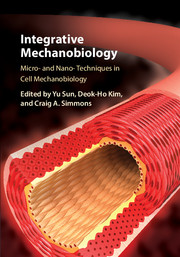Book contents
- Integrative Mechanobiology
- Integrative Mechanobiology
- Copyright page
- Contents
- Contributors
- Preface
- Part I Micro-nano techniques in cell mechanobiology
- 1 Nanotechnologies and FRET imaging in live cells
- 2 Electron microscopy and three-dimensional single-particle analysis as tools for understanding the structural basis of mechanobiology
- 3 Stretchable micropost array cytometry
- 4 Microscale generation of dynamic forces in cell culture systems
- 5 Multiscale topographical approaches for cell mechanobiology studies
- 6 Hydrogels with dynamically tunable properties
- 7 Microengineered tools for studying cell migration in electric fields
- 8 Laser ablation to investigate cell and tissue mechanics in vivo
- 9 Computational image analysis techniques for cell mechanobiology
- 10 Micro- and nanotools to probe cancer cell mechanics and mechanobiology
- 11 Stimuli-responsive polymeric substrates for cell-matrix mechanobiology
- Part II Recent progress in cell mechanobiology
- Index
- References
4 - Microscale generation of dynamic forces in cell culture systems
from Part I - Micro-nano techniques in cell mechanobiology
Published online by Cambridge University Press: 05 November 2015
- Integrative Mechanobiology
- Integrative Mechanobiology
- Copyright page
- Contents
- Contributors
- Preface
- Part I Micro-nano techniques in cell mechanobiology
- 1 Nanotechnologies and FRET imaging in live cells
- 2 Electron microscopy and three-dimensional single-particle analysis as tools for understanding the structural basis of mechanobiology
- 3 Stretchable micropost array cytometry
- 4 Microscale generation of dynamic forces in cell culture systems
- 5 Multiscale topographical approaches for cell mechanobiology studies
- 6 Hydrogels with dynamically tunable properties
- 7 Microengineered tools for studying cell migration in electric fields
- 8 Laser ablation to investigate cell and tissue mechanics in vivo
- 9 Computational image analysis techniques for cell mechanobiology
- 10 Micro- and nanotools to probe cancer cell mechanics and mechanobiology
- 11 Stimuli-responsive polymeric substrates for cell-matrix mechanobiology
- Part II Recent progress in cell mechanobiology
- Index
- References
Summary
Dynamic mechanical forces play a critical role in modulating cellular function, and inclusion of these extracellular stimuli in culture systems may improve the relevance and utility of biological results. In this work, we discuss recent advances made by our research group in applying dynamically controlled mechanical stimuli to cells cultured in 2-D and 3-D arrayed environments. Advantages in throughput and precision arising from microengineering such systems are demonstrated, with illustrative examples of potential biological applications. Engineering challenges associated with building these culture systems are explored, and the design and fabrication strategies that we have developed are discussed. Finally, the ability to incorporate additional sensing technologies into these dynamic screening platforms is explored.
Information
- Type
- Chapter
- Information
- Integrative MechanobiologyMicro- and Nano- Techniques in Cell Mechanobiology, pp. 47 - 68Publisher: Cambridge University PressPrint publication year: 2015
